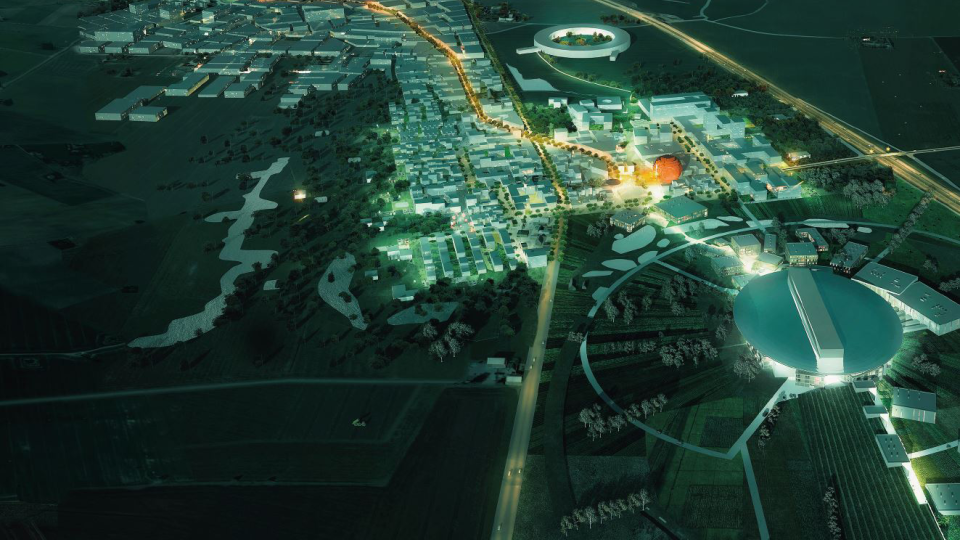Next milestone on Lund University’s road to Science Village: landlord wanted
Work is now in progress on procuring a landlord who wants to be part of the development of Nanolab Science Village. This means another milestone for Lund University’s establishment at the emerging Science Village – where the production of nanomaterials and semiconductor components will take place next door to the major research facilities ESS and MAX IV.
Evelina Lindén – Publicerad den 4 May 2023

A world-leading environment for innovation and research is currently growing at Brunnshög in the north-east of Lund. The existing major research infrastructures in the area, MAX IV and ESS, both offer unique world-class opportunities to investigate and analyze materials and molecular matter. But alongside these huge microscopes, an “atomic craft room” is needed.
“It’s one thing to be able to look, but you also need to be able to create these incredibly small structures, atom by atom, to test and refine the technology,” says Anders Mikkelsen, director of the government-funded interdisciplinary strategic research area NanoLund at Lund University.
The technology involved in nano research includes finding sustainable ways to harvest and store energy, for example through solar cells, efficient energy use in LED lighting and so-called semiconductors in our computer chips, sensors of various kinds, batteries, or new ways to find diseases earlier and enable personalized treatment. All with a safety mindset built in from the start.
The issue of semiconductor components is high up on the political agenda, linked to the European Chips Act – the EU initiative to ensure European access to and production of semiconductor components.
Necessary means to address global challenges
“Nanotechnology and nanoscience are essential to face global challenges and achieve a sustainable world. We are already working on this, but we are bursting at the seams. In order for researchers and industry to work together to solve the problems of the future, we need to be able to offer hands-on training to our students for tomorrow’s business. Integrating research, education, and nanolab activities in Science Village is an ideal way to do this,” says NanoLund's director Anders Mikkelsen.
Nanolab Science Village will provide a laboratory for manufacturing structures and semiconductor components. Together with Lund University’s planned establishment of research and education in the Science Village, this will create an international center for materials science, linking research in physics, chemistry, and biomedicine.
Creating a world-leading environment for research and innovation
In this way, the university is implementing the Swedish government’s vision of creating a world-leading research environment in materials science and life sciences around ESS and MAX IV. Contributing to an innovation environment with active collaboration with companies is also a very important aspect, which also includes open access to the infrastructure for companies.
“These sustainability initiatives are unique in their kind. They involve cutting-edge research in sustainability. The fact that the university is building its own laboratory for nanotechnology together with the activities and development in the environment of the Science Village will be of great importance for the creation of knowledge and research, in Sweden as well as internationally in the future,” says Erik Renström, Vice-Chancellor of Lund University.
And now the hunt is on for a landlord who wants to be involved in the design and construction of the premises together with this innovative and exciting tenant: Lund University is currently launching a procurement to find a host for the approximately 5,700 square meter premises planned for the Nanolab Science Village.
About the procurement and funding
- To finance the equipment for the new lab, an extensive funding program is underway. The largest contribution is planned from the Olle Engkvist Foundation, which intends to donate a total of SEK 100 million. Other major contributions come from the LMK Foundation, the Crafoord Foundation, and the Swedish Research Council through Myfab.
- Nanolab will be the third major research infrastructure in the Science Village. MAX IV and ESS are the others.
- The premises are estimated to cost around SEK 500 million, and the procurement is carried out under the Public Procurement Act (LOU 2016:1145).
About the aims of the Nanolab Science Village
- Provide an excellent research infrastructure for micro- and nanotechnology. An infrastructure for the development and fabrication of materials, structures, and components for advanced research in physics, materials science, nanoscience, chemistry, life sciences, energy and environment, and nanoelectronics.
- Outstanding training opportunities for the fabrication of semiconductor components, micro- and nanostructures for undergraduate students.
- Open access infrastructure for academia, institutes, and companies.
- Complementing and providing a platform for collaboration with MAX IV and ESS by offering an infrastructure for manufacturing and investigating samples at the micro- and nano-scale.
- Contribute to an innovation environment with active collaboration with companies.
- Provide stable and reproducible processes for cutting-edge applied and fundamental research.
- Built-in flexibility to support dynamic development.
- Design, workflows, and structures that provide even more safe handling of chemicals and gases.
- Larger areas, higher cleanliness, adequate access to ventilation, cooling, and electricity, allowing installation of more modern equipment.
- Premises designed to meet modern technical, acoustic, ventilation and heating, and accessibility requirements.
(From the project plan objectives.)
